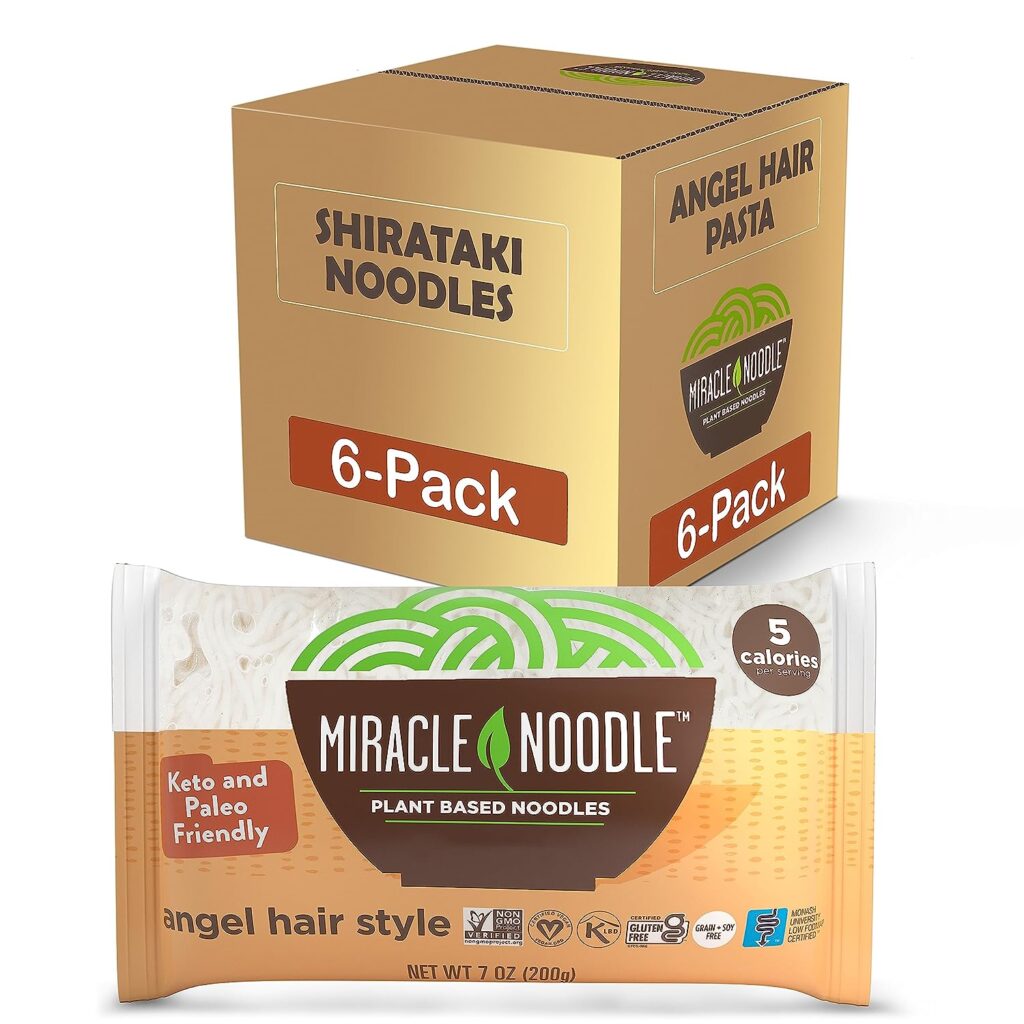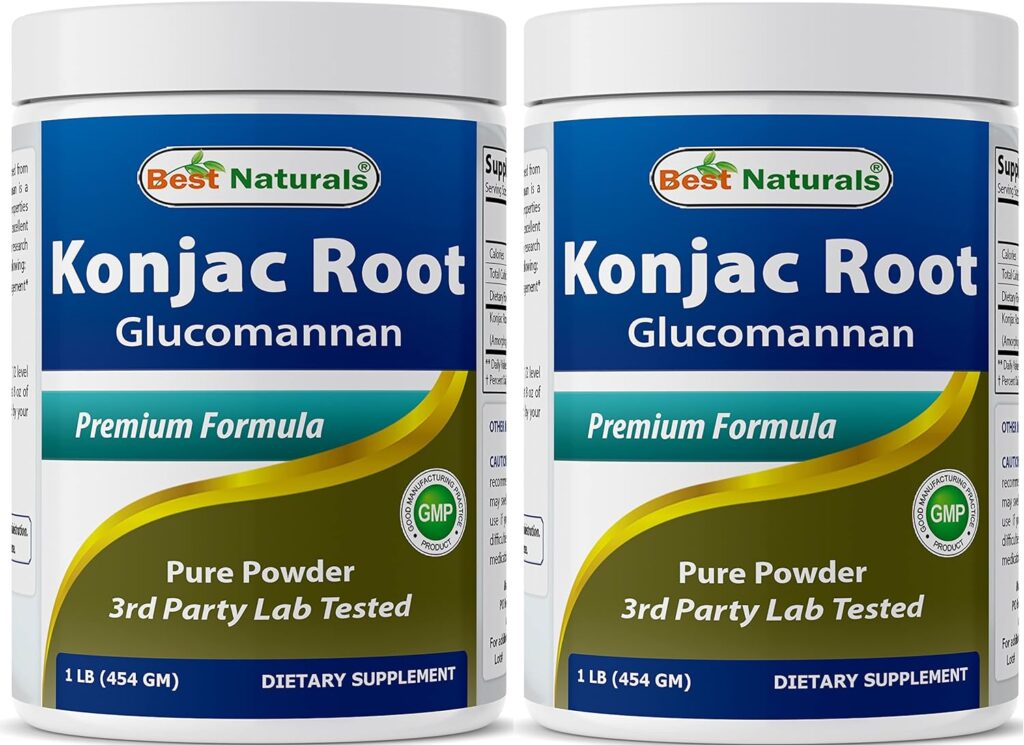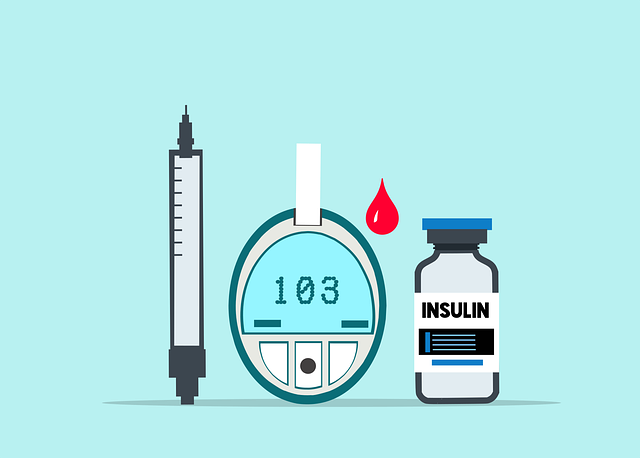Glucomannan is a water-soluble natural dietary fiber derived from the roots of the elephant yam, often known as konjac. It could be a useful weight-loss supplement. However, only when used correctly.
Weight loss isn’t always easy, and long-term success necessitates commitment and effort.
Numerous products and diet plans are touted as successful weight loss solutions with the promise of making things easier.
This article delves into the science of glucomannan and if it’s something you should be taking.
This post contains referral links for products we love. Staying Fit With Aeran earns a small commission on these links at no cost to you, and the links will always be marked with an asterisk *.
What Exactly Is Glucomannan?
Glucomannan is sold as a supplement, in drink mixes, and in food products such as pasta and flour. It is also the key component of shirataki noodles.*

Glucomannan accounts for 40% of the dry weight of the elephant yam, which is native to Southeast Asia. It’s been used for centuries in herbal combinations and traditional meals, including tofu, noodles, and konjac jelly.
It’s advertised as a dietary supplement, but it’s also utilized as a food additive — an emulsifier and thickening with the E-number E425-ii.
Glucomannan is one of the most viscous dietary fibers known, with an outstanding ability to absorb water.
It absorbs so much moisture that adding a small bit to a glass of water turns the entire contents into a gel. These distinct features are thought to mitigate its impact on weight loss.
How Does Glucomannan Help You Lose Weight?
Glucomannan is a type of dietary fiber that is water-soluble.
It, like other soluble fibers, is thought to aid in weight loss in numerous ways:
It contains extremely few calories.
It occupies stomach space and creates a sensation of fullness (satiety), lowering food intake at the next meal.
It slows stomach emptying, which increases satiety.
It, like other soluble fibers, decreases protein and fat absorption.
It also feeds the beneficial bacteria in your intestine, which convert it into short-chain fatty acids like butyrate, which has been shown in animal studies to protect against fat gain.
Feeding your gut microorganisms may offer additional advantages. Some research has found a link between changed gut bacteria and body weight.
Glucomannan is more viscous than most other soluble fibers, making it particularly useful for weight loss.
5 Health Advantages of Glucomannan
1. Loss of Weight
The fiber in konjac root is low in calories but high in fiber. This is a combo that, like many veggies, promotes a healthy waistline. Of course, the remainder of your food must be nutritious, and you must exercise consistently. Konjac powder can aid weight loss by producing a sense of fullness or satiety, which makes you less prone to overeat.
A 2005 study randomly assigned 176 healthy, overweight persons to consume either a fiber supplement or a placebo while on a calorie-restricted diet. Fiber supplements include glucomannan, glucomannan, and guar gum, or glucomannan, guar gum, and alginate. The subjects all ate a healthy 1,200-calorie diet along with either the fiber supplement or a placebo.
After a five-week observation period, the researchers discovered that all of the fiber supplements combined with the controlled diet resulted in weight loss when compared to the placebo plus diet. They find, however, that glucomannan specifically caused a drop in body weight in overweight but otherwise healthy people but that the addition of guar gum and alginate did not appear to generate any additional weight loss.
In contrast, certain studies, such as one published in the Journal of the American College of Nutrition in 2012, found that consuming glucomannan did not result in any statistically significant weight loss. However, I believe it is reasonable to conclude that glucomannan can be beneficial for boosting weight loss when accompanied by a weight-loss lifestyle that includes a nutritious diet and frequent exercise.
2. Organic Prebiotic
Probiotic meals are important for overall well-being and gut health; however, prebiotics are what truly “feed” probiotics. Prebiotics are non-digestible fiber compounds that include glucomannan, garlic, jicama, and artichokes. Glucomannan passes through the upper gastrointestinal tract undigested since the human body is incapable of entirely breaking it down. However, once prebiotics enter the colon and are fermented by the gut microorganisms, they produce probiotics.

Konjac root powder* is a prebiotic which benefits microorganisms in the digestive tract. A 2008 study found that glucomannan administration enhances the fecal concentration of probiotics as well as specific probiotics like bifidobacteria and lactobacilli.
What is the significance of this? Prebiotic use is associated with a variety of advantages. They are as follows.
- lowers risk of cardiovascular disease
- improves cholesterol levels
- improves gut health
- better digestion
- reduces stress response
- improves hormonal balance
- improves immunological function
- reduces risk of obesity and weight gain
- reduces inflammation and immunological responses
One of the reasons for the next benefit is that konjac root is a prebiotic.
3. Relief from Constipation
Constipation is a frequent ailment that is often caused by a low-fiber diet, dehydration, and a lack of physical activity. Glucomannan has been shown in several studies to be beneficial for constipation. When ingested, the powder acts as a prebiotic in your system, which promotes healthy bowel motions.
Glucomannan is classified as a bulk-forming natural laxative, which indicates that it can generate a larger, thicker stool that travels more readily through the colon. It also promotes stool that requires less effort to remove.
A preliminary trial and several double-blind trials revealed that glucomannan is an effective constipation treatment. For constipated people, glucomannan and other bulk-forming laxatives usually induce bowel movement within 12 to 24 hours after consumption. Three to four grams has been demonstrated in studies to be useful for constipation.
A 2008 study indicated that a low dose of konjac glucomannan supplement increased bowel movements in constipated persons by 30% and improved colonic ecology overall.
4. Reduces Cholesterol
Some studies using glucomannan had a substantial positive effect on total Cholesterol, LDL cholesterol, triglycerides, body weight, and fasting blood glucose. It had no effect on HDL cholesterol or blood pressure.
In these investigations, glucomannan was able to perform the following things:
- Reduce your total Cholesterol by 19.3 mg/dL.
- Reduce your LDL cholesterol by 16 mg/dL.
- Reduce triglyceride levels by 11.1 mg/dL
- Reduce fasting blood sugar levels by 7.4 mg/dL.
How does glucomannan assist the body in lowering these critical health indicators? Because it is a fiber-centric substance, it can minimize cholesterol absorption in the stomach by sponging up water in the digestive system, which inhibits cholesterol absorption by the body. As a result, your blood has less Cholesterol.
5. Aids Diabetics
There have been around 20 research investigations on glucomannan and diabetes. It can aid diabetics by delaying the stomach’s natural emptying process, resulting in more gradual sugar absorption and lower blood sugar levels after meals.
Some studies published in Diabetes Care (just 11 hyperlipidemic and hypertensive type 2 diabetics) found that konjac fiber had highly good effects. The trial participants, who were being treated traditionally with a low-fat diet and medication therapy, were given konjac fiber-enriched biscuits. Overall, the researchers concluded that adding konjac fiber to standard treatment may enhance blood sugar control, lipid profile, and systolic blood pressure in high-risk diabetes patients. As a result, they believe konjac fiber can improve the efficacy of traditional type 2 diabetes treatment.

Another study fed 72 type II diabetics konjac for 65 days. Overall, the researchers concluded that konjac food is quite beneficial in the prevention and treatment of hyperglycemia. Diabetics are frequently affected by hyperglycemia or elevated blood sugar. It is a condition in which an abnormally high level of glucose (sugar) circulates in the blood.
Overall, taking glucomannan or incorporating it into your diet can help to reduce Cholesterol, blood sugar levels, and blood pressure in diabetics, which is why it should be included in a good diabetic diet plan.
To Conclude: Do You Want to Try Glucomannan?
According to the data, glucomannan is a useful weight-loss supplement. However, as with any weight-loss method, it cannot be used in isolation.
The only known long-term approach to losing weight is to make changes to your lifestyle.
Glucomannan can help, but it won’t cure everything on its own.
